Project Outline
Digital dialogues on diet: harvesting the archive for alternative patterns in Queensland food culture investigates Queensland’s colonial history through food. The drive to seek food in known and unknown landscapes extends beyond the bowl and the fire, enabling deep inquiry on cross-cultural exchange, exploitation, and resistance. We find in food broader questions of landscape, people, and the sometimes-prickly coexistence of the human and non-human world.
This project is a meeting of disciplines. Our collaborative engagement and cross-disciplinary activity—one researcher working in archaeology, the other engaged in practice-led creative research—sparked significant moments of conversation and engagement. The outputs we present here explore tangential lines of inquiry borne from a shared pool of resources.
Georgia Rolls’ essay, ‘The politics of food: Oysters, Indigenous knowledge, and colonial exploitation’, uses newspapers, historical photographs, and cultural artefacts to investigate diverse cultural approaches to harvesting the natural world. Artistic representation and archaeological techniques, including carbon dating, oral histories, and the press, reveal how food indexes different knowledge creation, exchange, and colonial power and politics.
In a collage-based textual assemblage, Eva Phillips explores Moreton Bay’s culinary history against a backdrop provided by surveyor Robert Dixon. This feminist creative work references nineteenth-century Australian female poets, concepts of ethnographic verse, and settler and Indigenous poetics and visual art to play with ‘only absorption: made visible’ the shifting ideas of margins and marginalia. Who crafts the margins, who believe they live there, and what we can say for a more angled squint from the side-lines approach to research? Dixon’s hand has traced many landscapes along the east coast, and his time spent as surveyor in charge in the Moreton Bay district was coloured by acts of suspected mutiny and cartographical defiance—an appropriate theatrical backdrop to the convoluted text it bears.
‘The politics of food’ and ‘only absorption’ speak to each other through the past. These reflexive dialogues spring from one of our most basic needs—eating—and conjure a smorgasbord of colonial consumption; economic, political, and cultural. We hope readers engage with our work and detailed resource list in critical and creative ways.
We conducted this project on the unceded lands of the Jagera and Turrbal people. Funding was provided by Griffith University’s Arts, Education and Law summer scholars programme with the support of the Harry Gentle Resource Centre.
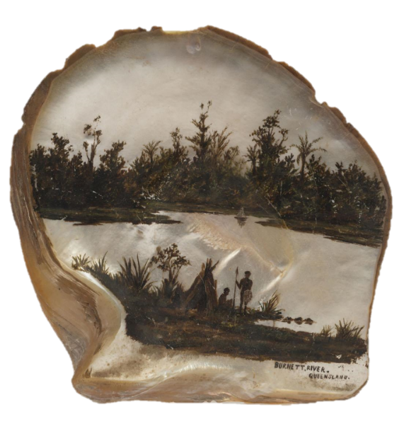
A curious piece of folk art painted by an unknown colonial artist came under the hammer in late 2020. Depicted on what appears to be a Black Lip Oyster, an Aboriginal man crouches or sits by a hut. Another subject nearby holds a spear and shield.
The artist’s observational and idyllic depiction of Indigenous lives and lifestyles is typical of many colonial paintings. Its peaceful riverine backdrop sits uneasily with the brutal realities of colonialism and dispossession.
Oyster or pearl shells were not an uncommon canvas for amateur artists in the nineteenth century. The pursuit was popular enough that the Queenslander provided instruction on the hobby for its readers in late 1899, with different techniques for watercolours and oils.
Other examples of contemporary shell art included decorative engravings, nautical scenes, and coats of arms. Those depicting Aboriginal and Torres Strait Islander peoples are an uncomfortable reminder of our colonial past.
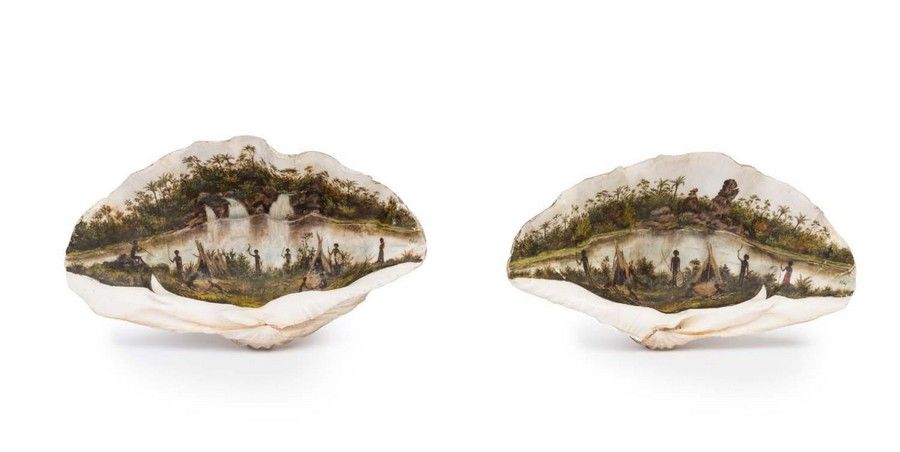
Commercialising traditional seafood
Oyster shell art takes on greater significance, considering shellfish’s importance to First Nations diets and culture. Painted somewhere on the Burnett River on the central coast, the lush surrounds in image 1 belie the damage and disruption of commercial oyster farming to the Queensland coast and its estuaries.
Queensland’s colonial government first declared a commercial stake in oysters in the Fisheries Act 1878. It claimed fertile oyster grounds from the Tweed River to Gladstone, traditionally used by Aboriginal peoples for countless generations.
By the early 1920s, the government and oyster farmers recognised the estuaries and foreshores around Russell, Stradbroke, Moreton, Lamb, McLeay, and Coochiemudlo Island as ‘first-class oyster grounds’. The Wide Bay region, where our oyster was painted, was noted for ‘some of the river estuaries… producing excellent specimen for [oyster] maturing grounds’ (The Queenslander , 15 Jul 1922, 41).
State returns for 1919 show the scope and scale of the oyster industry. Eighty-five boats employed 108 men who worked 572 dredging leases and oyster bank licences in that year alone. An astonishing 14,880 bags of oysters had been hauled from Queensland’s waterways in the preceding 12 months (The Queenslander, 15 Jul 1922, 41).
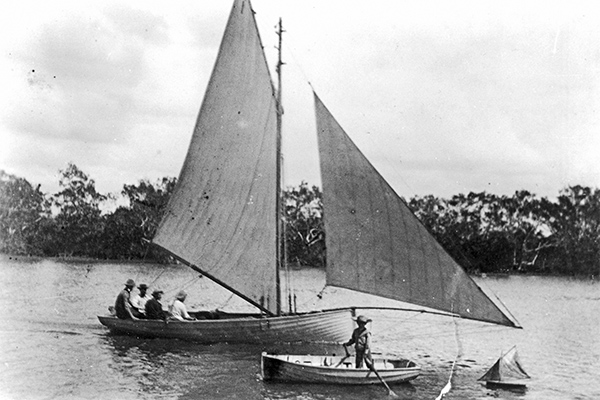
Middens, cultural knowledge, and archaeology
Shell middens index the cultural importance of salt and freshwater shellfish to Indigenous people. They reveal crucial information about Indigenous campsites and food sources, shellfish species and biodiversity.
Australian archaeologists have studied middens since the nineteenth century. They commonly use radiocarbon dating to determine the age of a shell midden. It provides an age estimate with an error range by using samples of a shell to track its decomposition of carbon relative to the age of the shell.
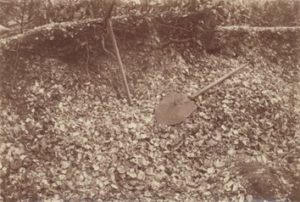
Radiocarbon dating has its limits. Tides, humans, animals, and weather easily disturb middens, which are randomly structured over time, as well. Additional integration of carbon particles from external environmental sources can also skew results. The written historical record, and predominantly Indigenous oral histories, provides otherwise vital evidence to understand these sites and their significance.
Archaeological excavation of middens also reveals other cultural practices associated with food. In the mid-1970s, for instance, archeologists found clay tobacco pipes ‘in situ’ (within) two separate midden sites on the east coast of K’Gari (Fraser Island). Researchers suggest these pipes were deposited into the middens after the 1850s and may have been highly valued items integrated into traditional smoking practices (Courtney and McNiven, 1998: 51).
Reflexivity and resistance
The juxtaposition of ancient shell deposits and European artefacts potentially signals initial collaboration and exchange, an early interest in trade and the acquisition of ‘new’ and foreign products.
Seafood and fish formed a vital part of this nascent nineteenth-century economy (Ray Kerkhove, 2013: 144-56). In 1861, for instance, the Courier noted that, ‘Until very recently the inhabitants of Brisbane depended mostly for a supply of fish upon the aborigines of this locality [sic.].’ Four years later, Mr Bonney of the Melton Mowbray Hotel at Breakfast creek successfully spawned roe from five black trout he acquired from a local Aboriginal man (Brisbane Courier, 19 Jan 1865, 2).
As Europeans became increasingly familiar with local ecosystems and foods, which they so often gained from Indigenous inhabitants, Indigenous peoples became increasingly disadvantaged. The 1861 Brisbane Courier by-line, ‘TURNING THE TABLES’ , was an ominous portent of what was to come.
Resistance and reclamation
First Nations peoples resisted imposed colonial authority and control to maintain cultural identities. They kept alive cultural practices of preparing and sharing food despite missions, enforced removal and dislocation, replacing traditional diets with new foods like flour and sugar.
Middens also remained important Indigenous sites, even as dominant folk art forms like shell painting culturally appropriated traditional foodstuffs like oysters to depict idealised portrayals of Indigenous peoples and cultures.
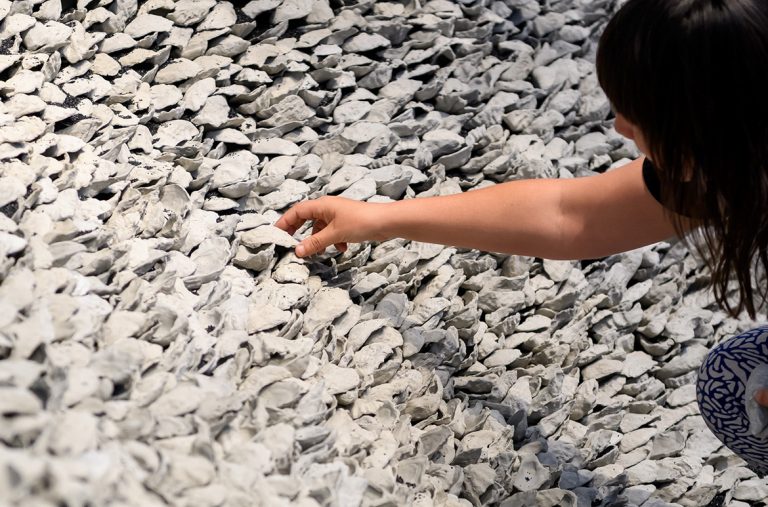
Quandamooka artist Megan Cope’s recent art midden-like installation, RE FORMATION 2019, made from 12,000 pieces of cast concrete ilmenite, marks a critical intervention in this space. It highlights the scope and scale of oyster shells in First Nations’ histories, cultures, and communities, reclaiming the culturally appropriated canvas. Reframing the colonial lens, Cope invites us to consider critically the politics of food with fresh eyes (video interview 2020).
List of references
Primary Sources
‘A folk art painted pearl shell with Queensland Aboriginal scene, titled lower right ‘Burnett River, Queensland’, 20x19cm’. Lot 459, Sale 467 ‘Australian and Historical’, Leski Auctions. ©Leski Auctions. Reproduced with permission.
Campbell, Archibald James. ‘Oyster shell heap left by Aboriginal people, 1870.’ National Library of Australia.
‘Dugong Fishing c1890.’ State Library of Queensland, John Oxley Library Copy Print Collection. Not digitised.
Henderson, Dr H. W. B. ‘Tripcony Family Members on Con Tripcony’s Oyster Cutter “Nancy” in Moreton Bay ca 1889.’ Image P87024, Courtesy of Sunshine Coast Libraries.
A pair of rare and important hand-painted clam shells depicting North Queensland Aboriginal scenes, 19th century, monogrammed M.G. approximate size 17 x 27 cm each. © Mossgreen Auctions. HGRC has made all reasonable efforts to contact the copyright owner. Please contact us if you have further copyright information.
Newspapers
No title, Brisbane Courier, 19 Jan 1865, 2.
https://trove.nla.gov.au/newspaper/article/1267218
‘Home Decorations: SHELL PAINTING’, Queenslander, 25 Nov 1899, p. 1058.
http://nla.gov.au/nla.news-article22562623
‘Local intelligence’, Courier 17 Aug 1861, 2.
http://nla.gov.au/nla.news-article4600551
Unicorn. ‘Science and Industry. The oyster industry: its origins and development,’ Queenslander, 15 Jul 1922, 41.
http://nla.gov.au/nla.news-article27433269
Secondary Sources
Buttrose, Ellie. ‘MEGAN COPE’S “RE FORMATION” TAKES THE OYSTER SHELL AS ITS SUBJECT,’ 8 Jan 2020. https://blog.qagoma.qld.gov.au/megan-copes-reformation-takes-the-oyster-shell-as-its-subject-water/
Courtney, Kris and Ian McNive. ‘Clay Tobacco Pipes from Aboriginal Middens on Fraser Island, Queensland.’ Australian Archaeology 47, no. 1 (1998): 44-53.
Jones, Nicola. ‘Carbon dating, the archaeological workhorse, is getting a major reboot’, Nature, 19 May 2020. https://www.nature.com/articles/d41586-020-01499-y
Kerkhove, Ray. “Aboriginal Trade in Fish and Seafoods to Settlers in Nineteenth-Century South-East Queensland: A Vibrant Industry?” Queensland Review 20, no. 2 (2013): 144-56.
Marshall, Candice and Peter Scott. ‘Shell Midden provides insight into Indigenous life.’ ABC news; podcast Burleigh Heads: the Indigenous side, 1 Jun 2012. https://www.abc.net.au/local/audio/2012/05/25/3515206.htm
Murgha, Letitia, ‘Indigenous Science: Shell middens and fish traps.’ Queensland Museum Network. https://blog.qm.qld.gov.au/2012/10/08/indigenous-science-shell-middens-and-fish-traps/
Redland City Council. ‘Quandamooka: Local history as recorded since European settlement.’ Redlands Coast Timelines, Redland Libraries.
https://www.redland.qld.gov.au/download/downloads/id/3982/quandamooka_timeline.pdf
In a collage-based textual assemblage, Eva Phillips explores Moreton Bay’s culinary history against a backdrop provided by surveyor Robert Dixon. This feminist creative work references nineteenth-century Australian female poets, concepts of ethnographic verse, and settler and Indigenous poetics and visual art to play with ‘only absorption: made visible’ the shifting ideas of margins and marginalia. Who crafts the margins, who believe they reside there, and what can be said for a more angled, squint from the side-lines approach to research? Dixon’s hand has traced many landscapes along the east coast, and his time spent as surveyor in charge in the Moreton Bay district was coloured by acts of suspected mutiny and cartographical defiance— an appropriate theatrical backdrop to the convoluted text it bears.
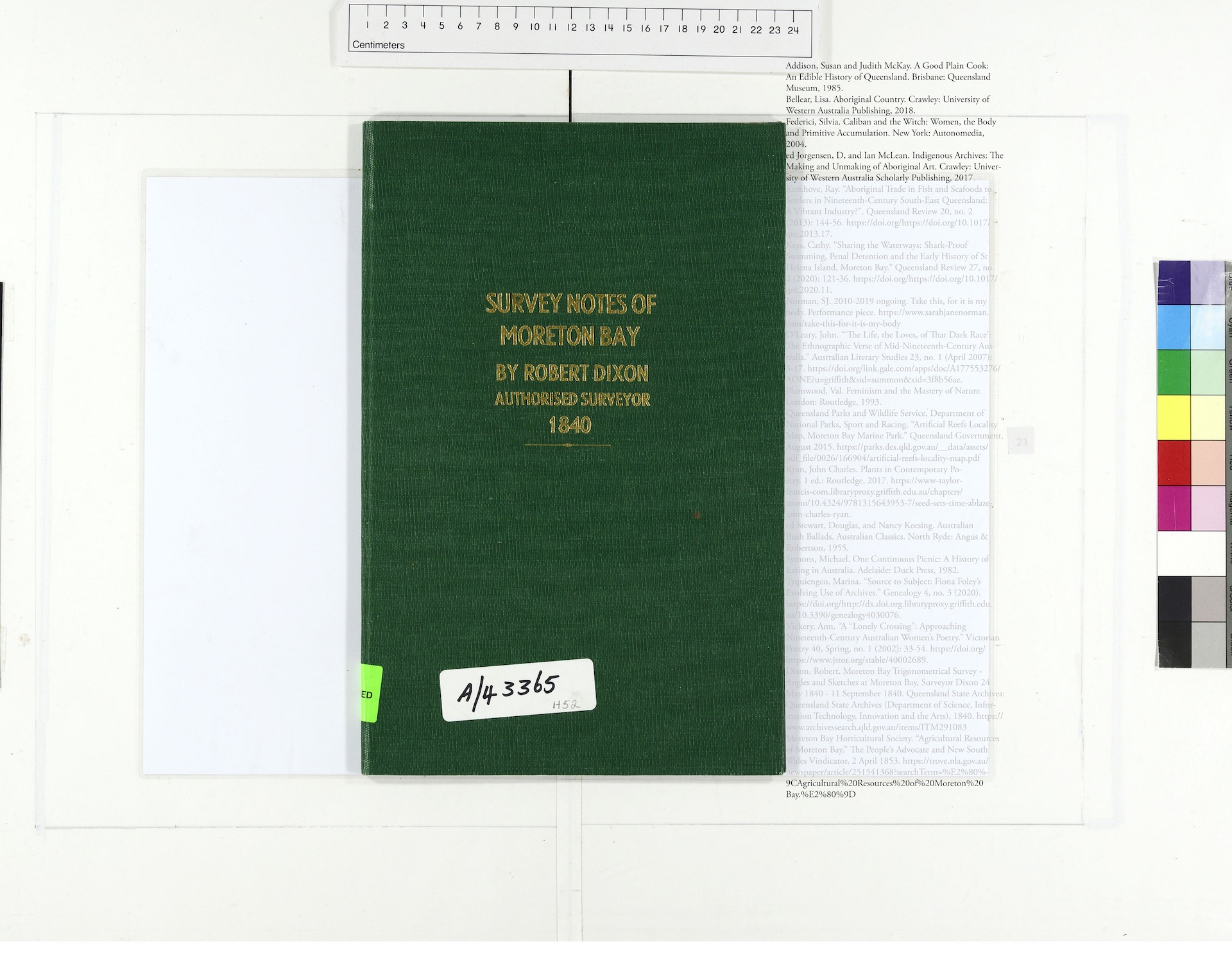
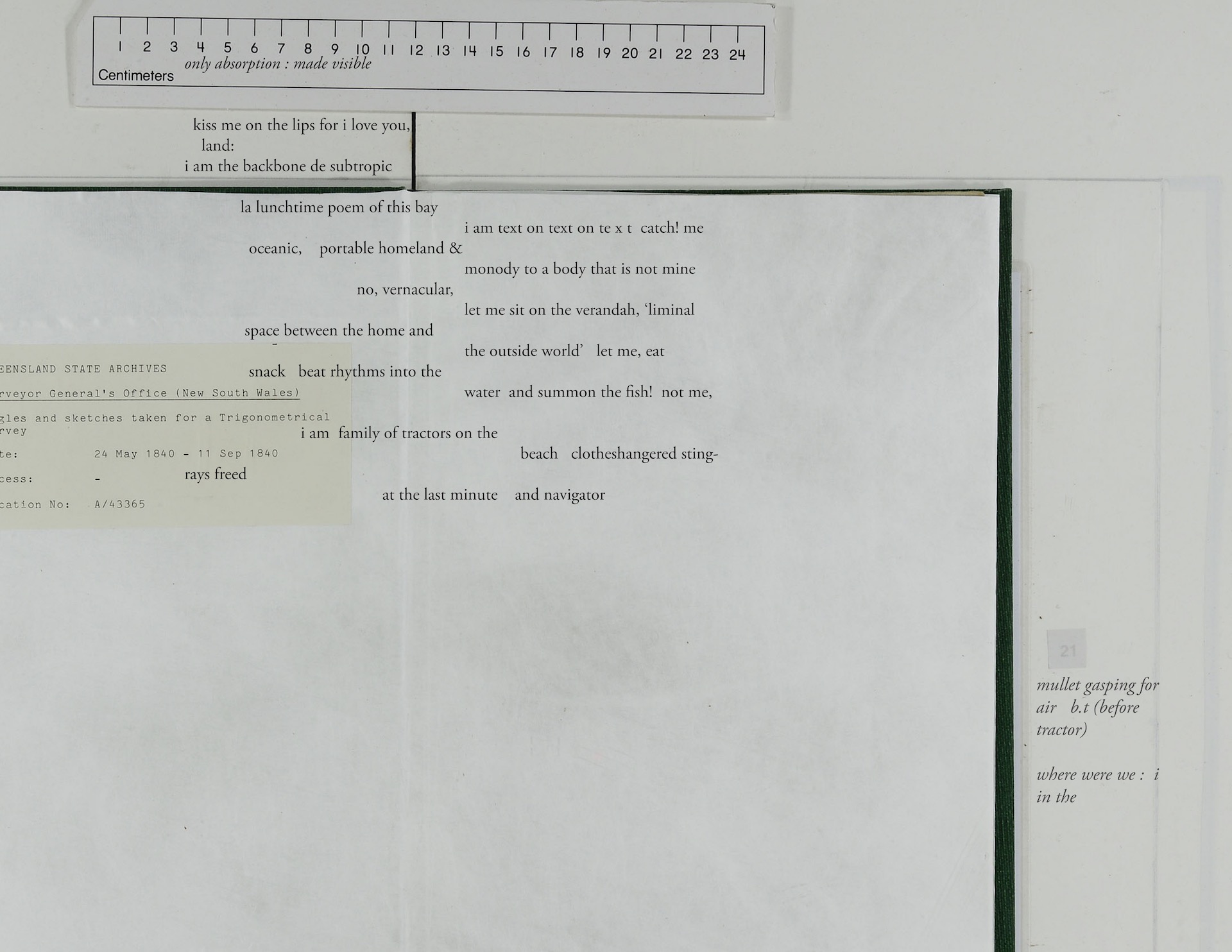
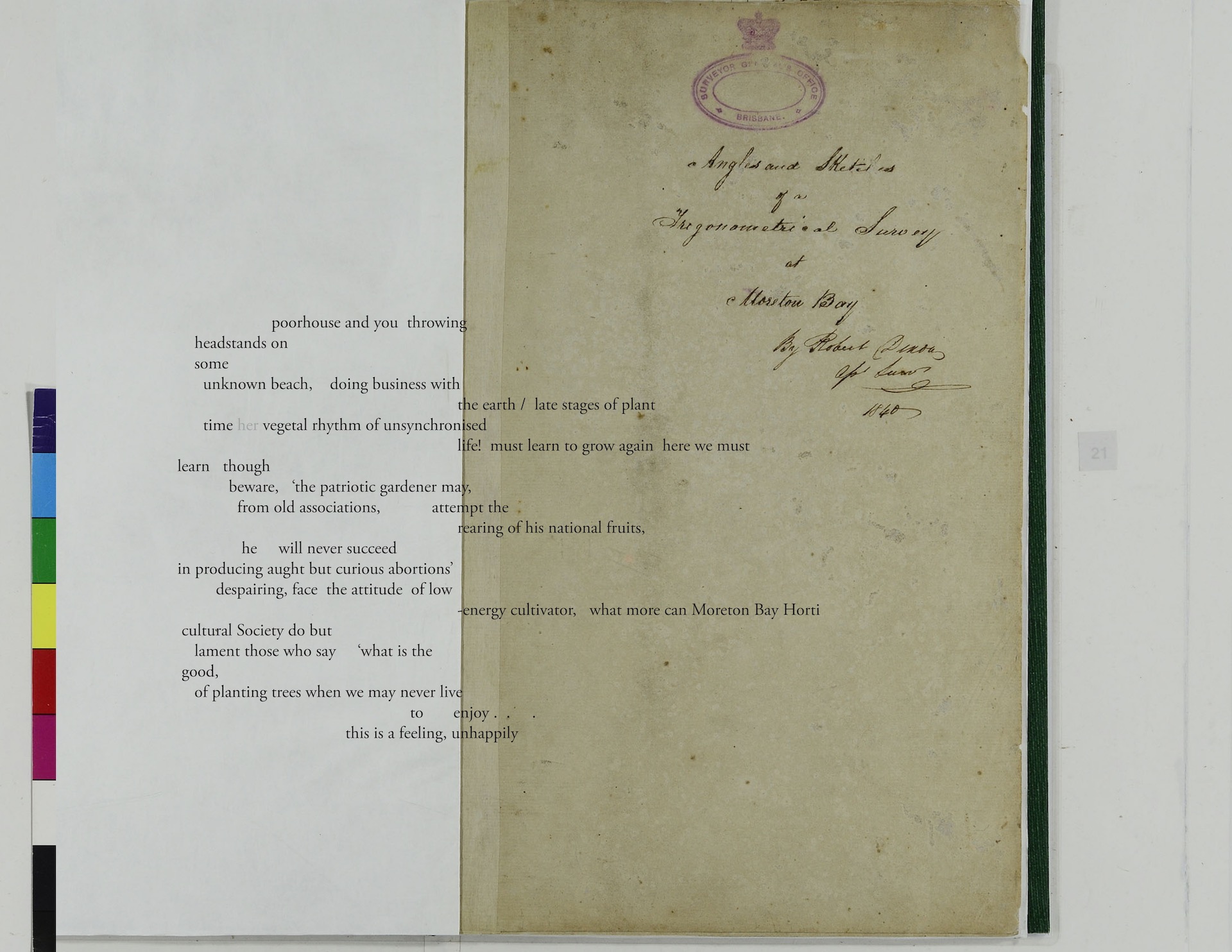
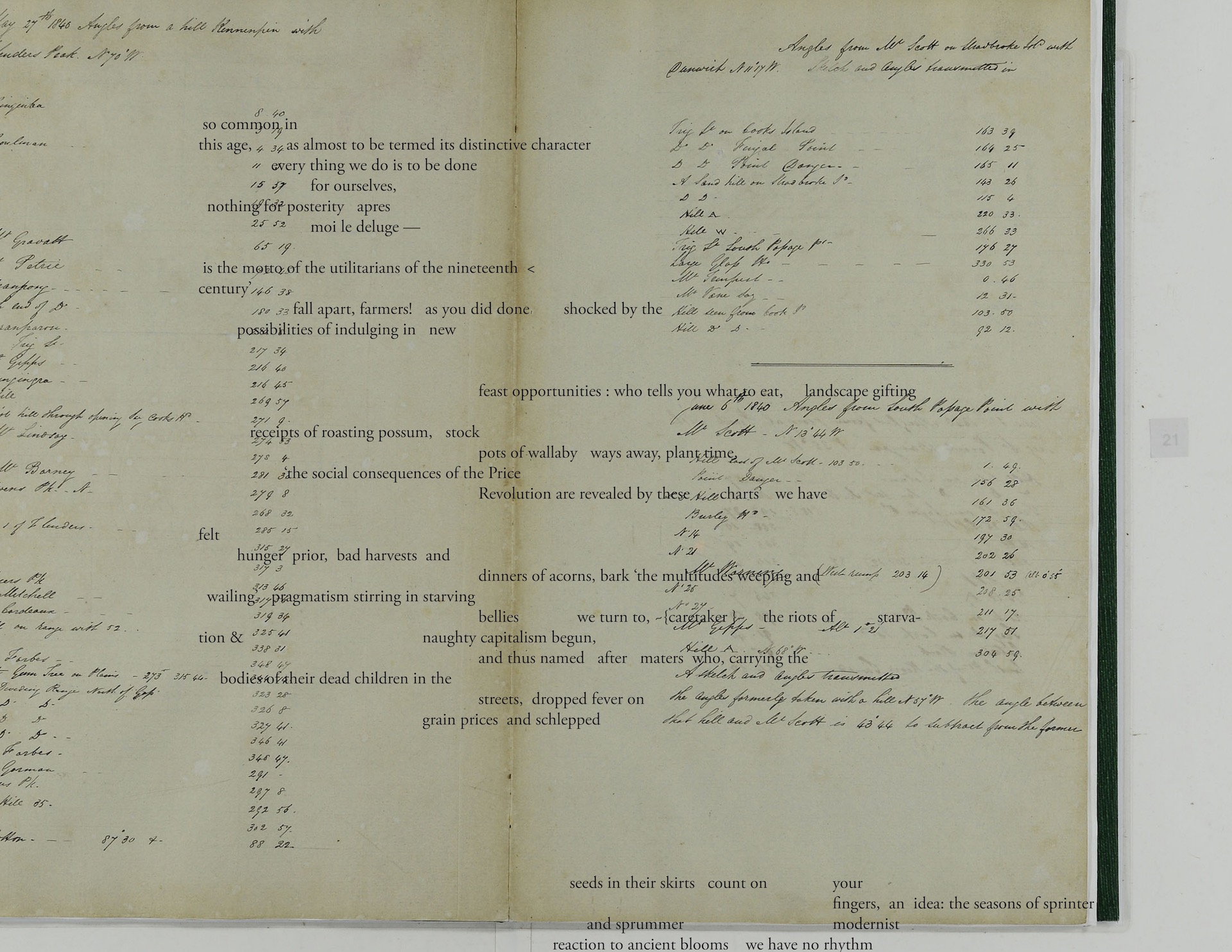
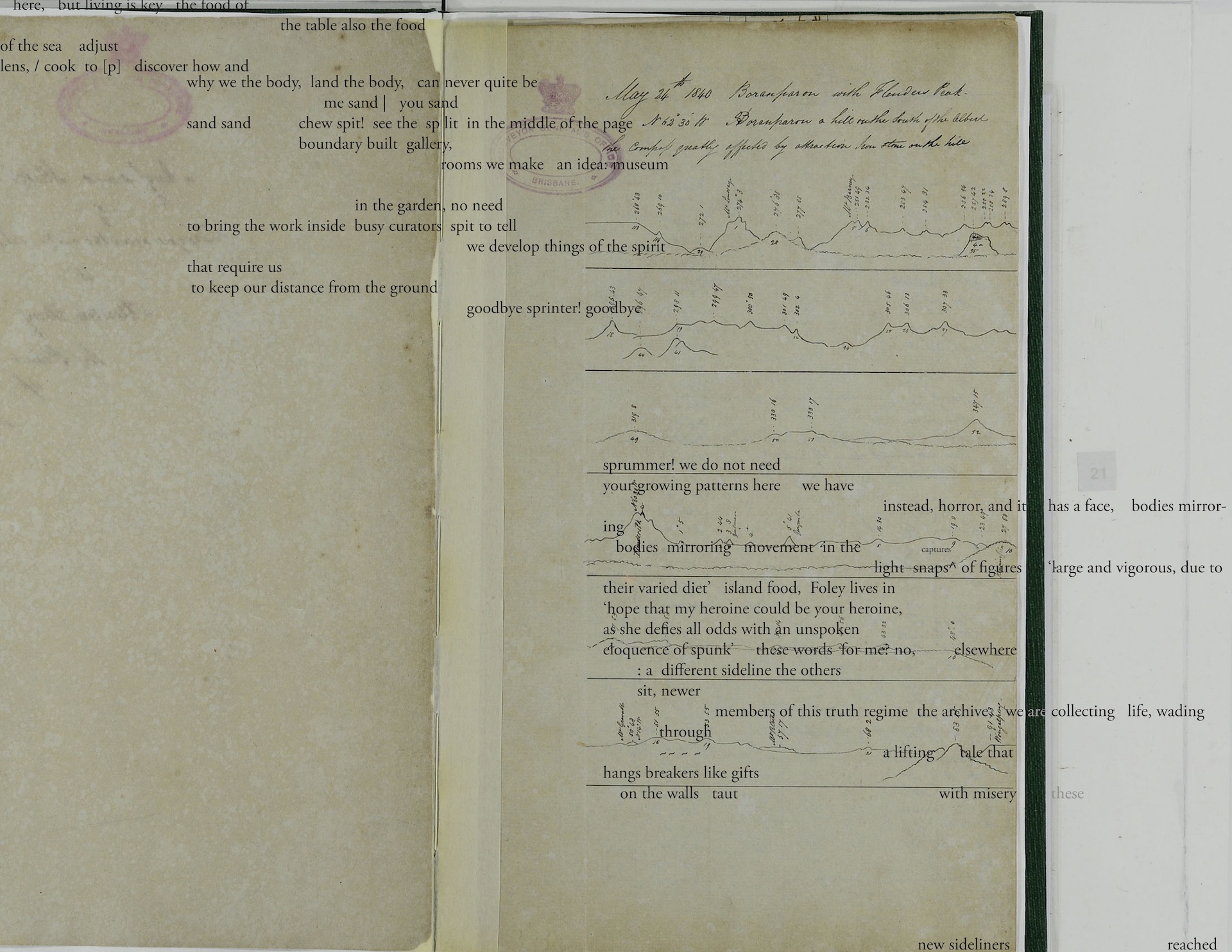
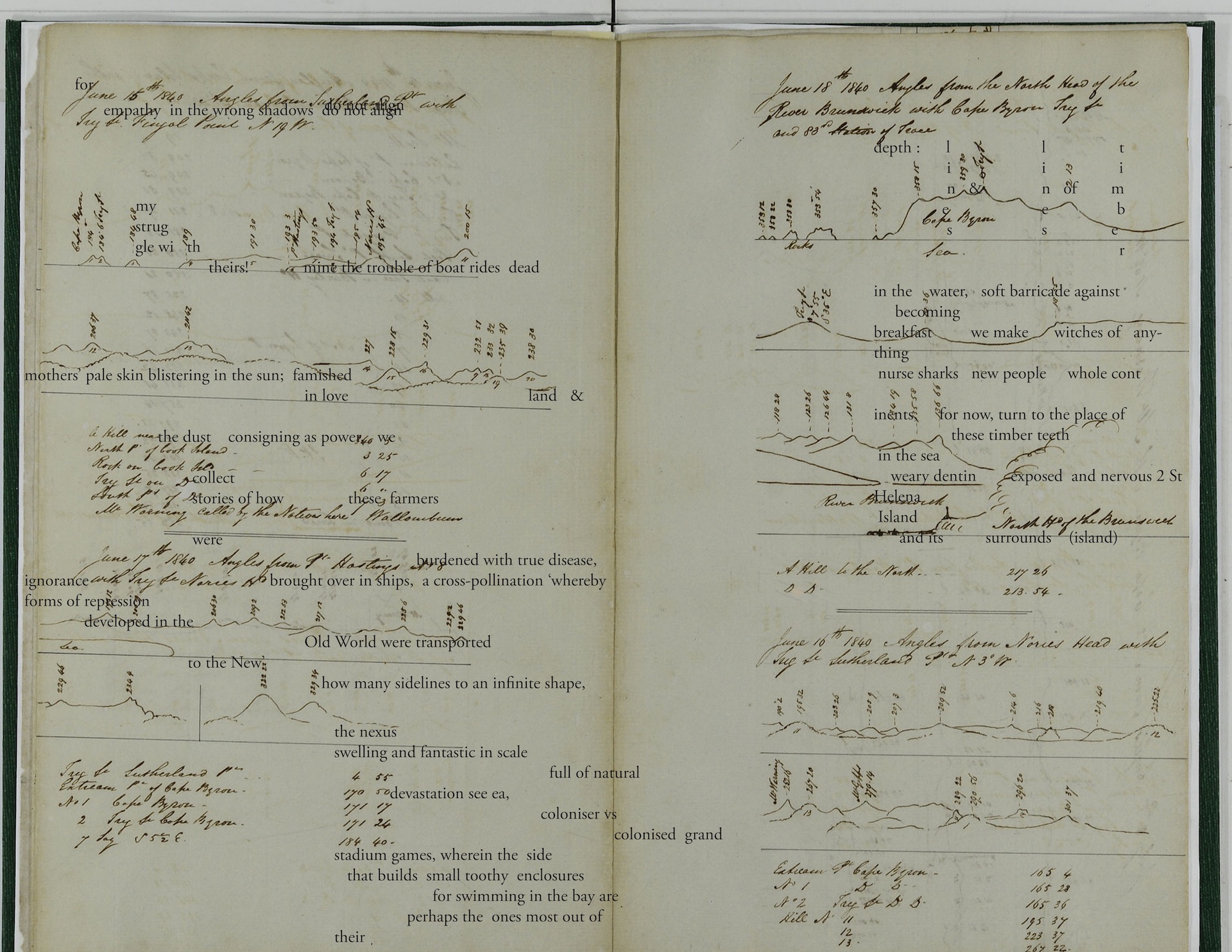
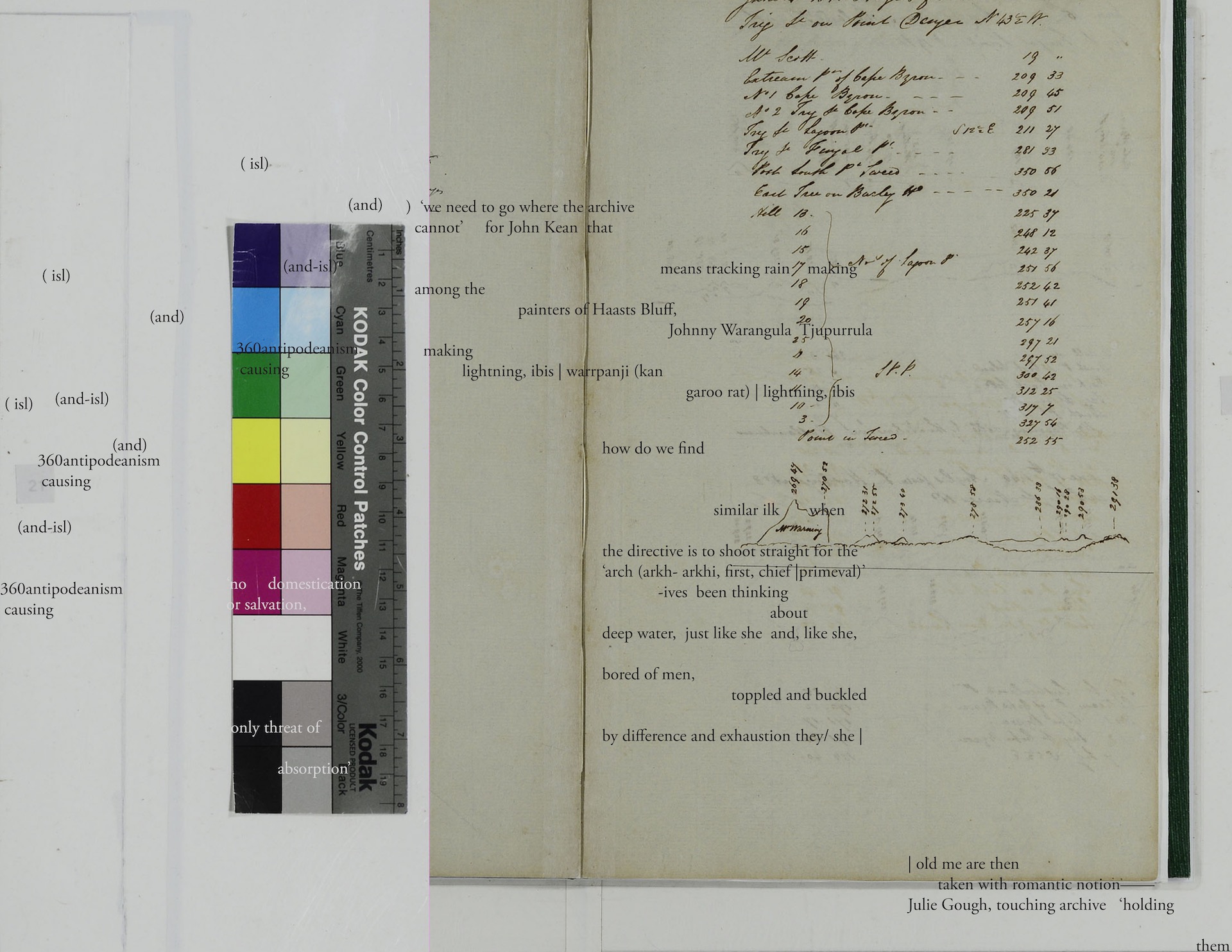
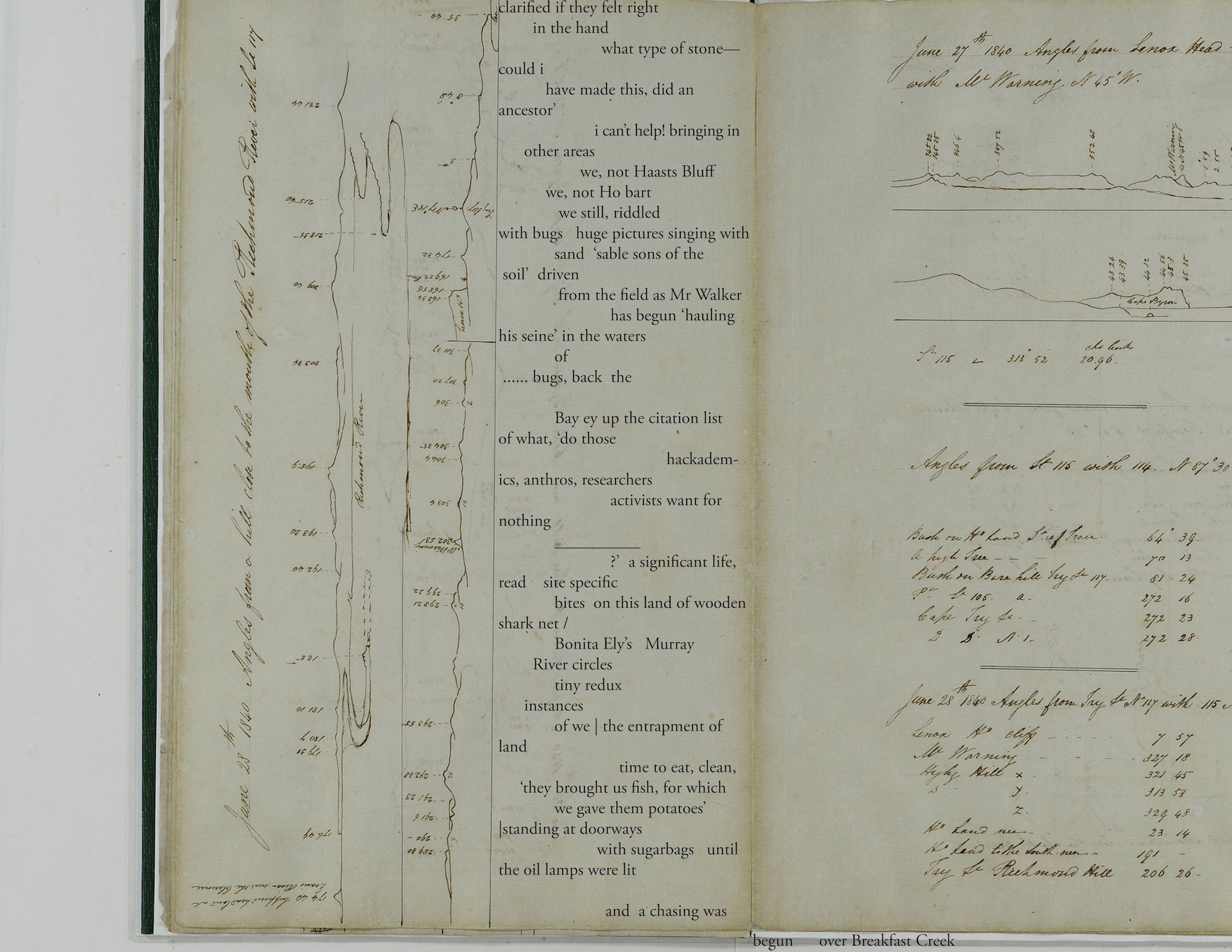
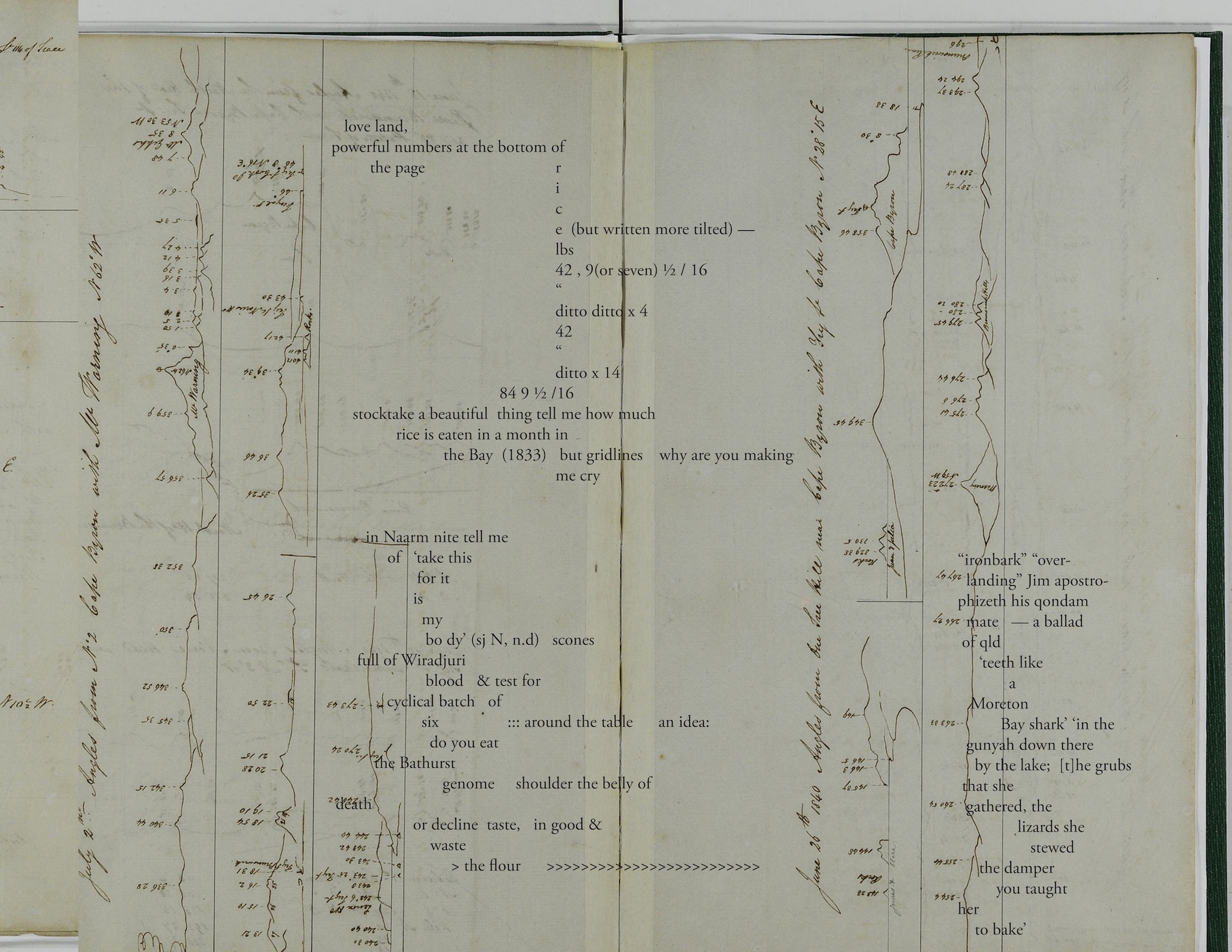
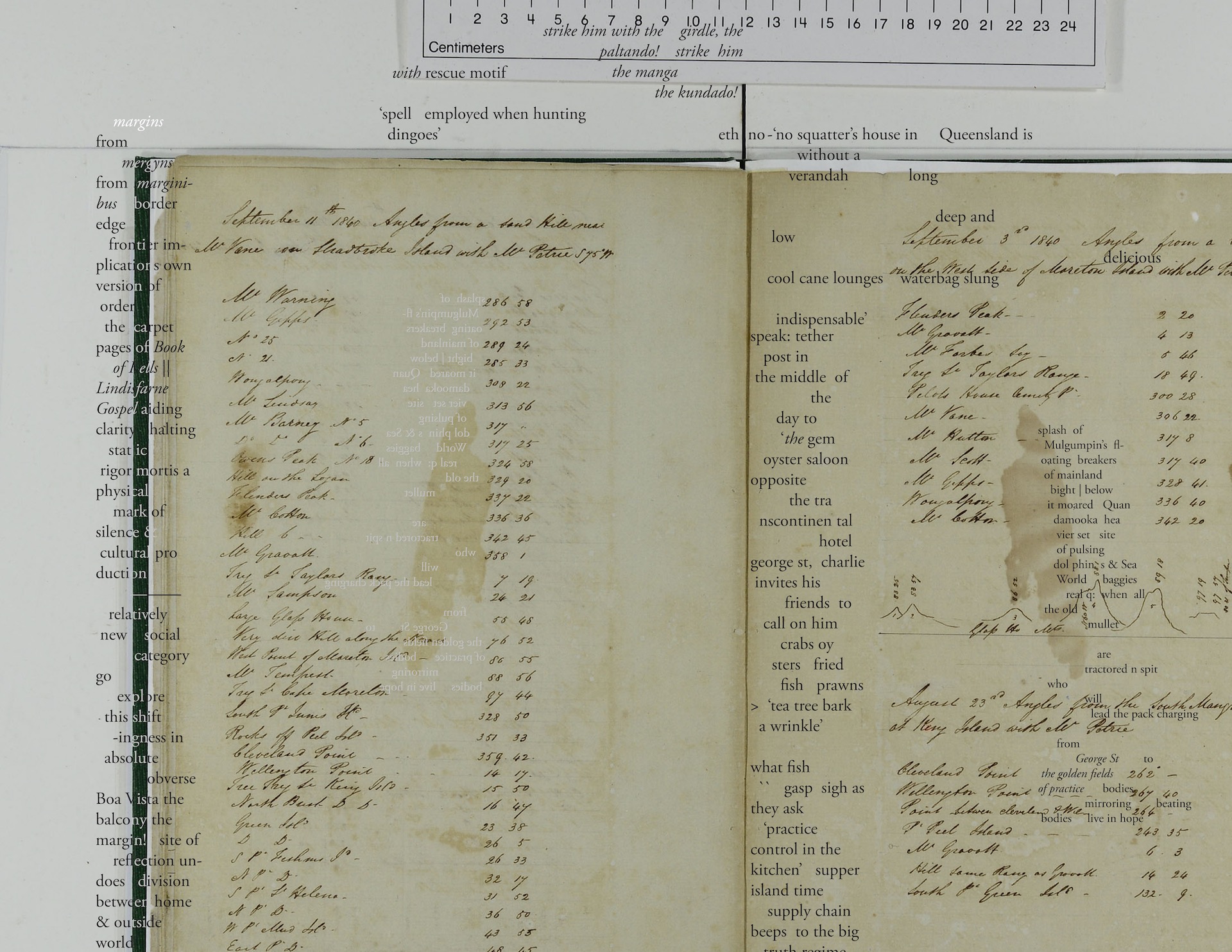
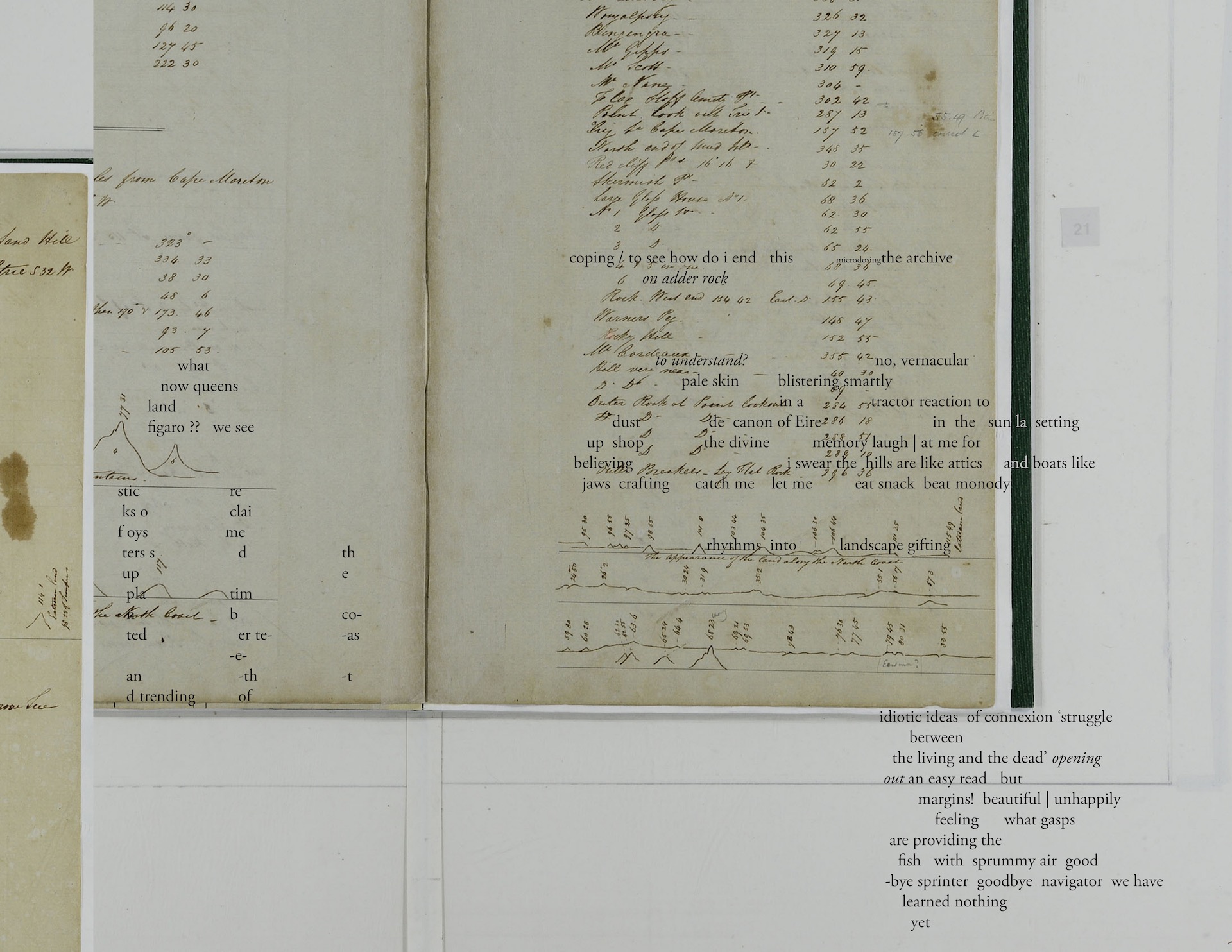
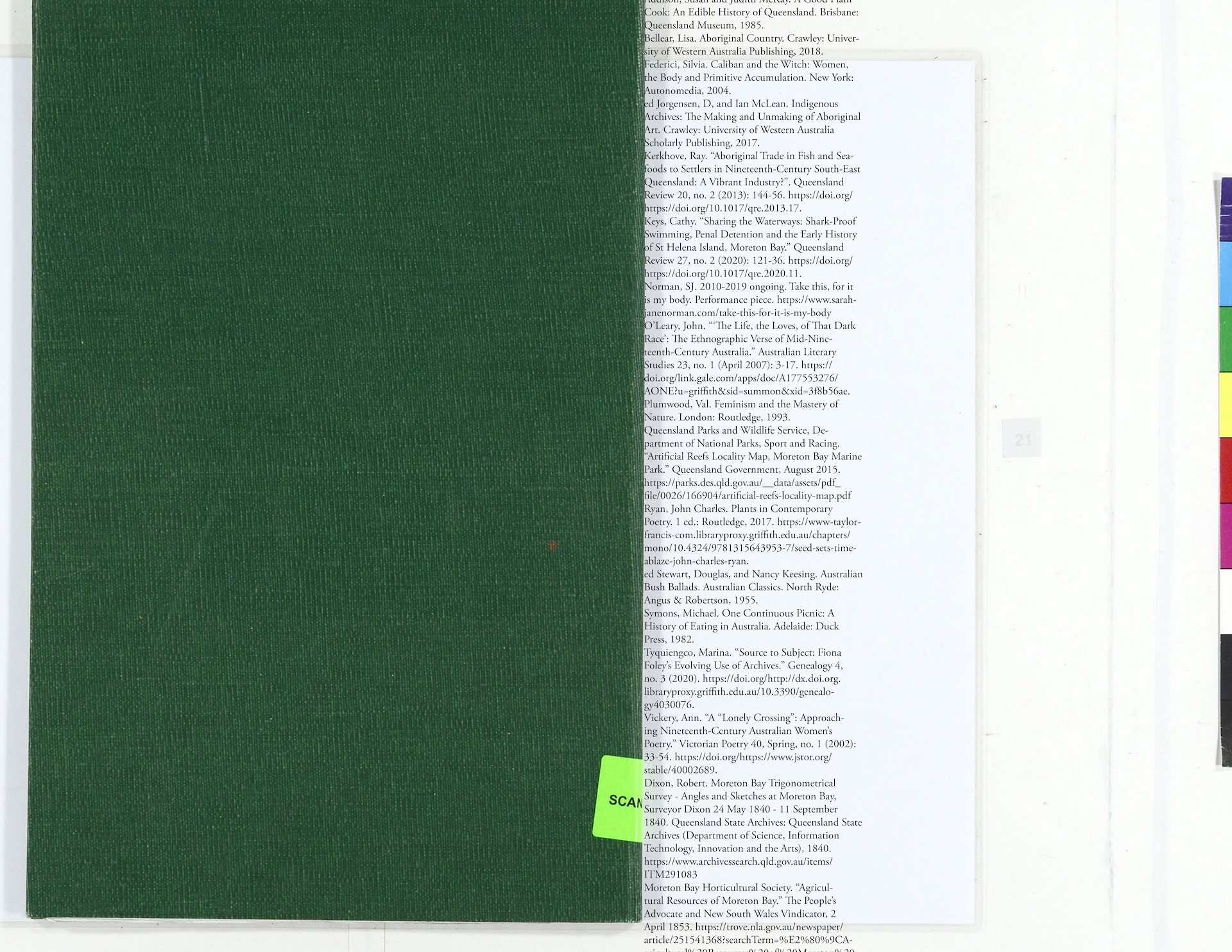
only absorption : made visible
Note: I have provided this readable, text-only version of only absorption : made visible for equity and access. The creative work is designed to be read as part of the collage where reading is deliberately difficult. The intentionally challenging text highlights the problems of accessing marginalised voices within the archives, and the heavy-handed ways in which many settlers have engaged with the Australian landscape. This text-only version has been rearranged in format but remains identical in content.
only absorption : made visible
kiss me on the lips for i love you,
land:
i am the backbone de subtropic
la lunchtime poem of this bay
i am text on text on te x t catch! me
oceanic, portable homeland &
monody to a body that is not mine
no, vernacular,
let me sit on the verandah, ‘liminal
space between the home and
the outside world’ let me, eat
snack beat rhythms into the
water and summon the fish! not me,
i am family of tractors on the
beach clotheshangered stingrays freed
at the last minute and navigator mullet
gasping for air b.t
(before tractor)
where were we : i in
the
poorhouse and you throwing
headstands on
some
unknown beach, doing
business with
the earth / late stages of plant
time her vegetal rhythm of unsynchronised
life! must learn to grow
again here we must
learn though
beware, ‘the patriotic gardener may,
from old associations, attempt the
rearing of his national fruits,
he will never succeed
in producing aught but curious abortions’
despairing, face the attitude of low
-energy cultivator, what more
can Moreton Bay Horti
cultural Society do but
lament those who say ‘what is the
good, of planting trees
when we may never live
to enjoy . . .
this is a feeling, unhappily
so common in
this age, as almost to be termed its distinctive character
every thing we do is to be done
for ourselves,
nothing for posterity apres
moi le deluge —
is the motto
of the utilitarians of the nineteenth <
century’
fall apart, farmers! as you did done shocked
by the
possibilities of indulging in new
feast opportunities : who
tells you what to eat, landscape gifting
receipts of roasting possum, stock
pots of wallaby ways away, plant
time,
‘the social consequences of the Price
Revolution are revealed by these charts’ we
have felt hunger prior, bad harvests and
dinners of acorns, bark ‘the multitudes
weeping and
wailing’ pragmatism stirring in starving
bellies we turn to, ~
{caretaker }~ the riots of starvation &
naughty capitalism begun,
and thus named after maters
who, carrying the
bodies of their dead children in the
streets, dropped
fever on
grain prices and schlepped
seeds in their skirts count on your
fingers, an idea: the seasons
of sprinter
and sprummer modernist
reaction to ancient blooms we have no rhythm
here, but living is key the food of
the table also the food of the
sea adjust
lens, / cook to [p] discover how and
why we the body, land the body, can never quite be
me sand | you sand
sand sand chew spit! see the sp lit in the middle of the page
boundary built gallery,
rooms we make an idea: museum
in the garden, no need
to bring the work inside busy curators spit to tell
we develop
things of the spirit that require us
to keep our distance from the ground
goodbye sprinter! goodbye
sprummer! we do not need
your growing patterns here we have
instead, horror, and it
has a face, bodies mirroring
bodies mirroring movement in the captures
light snaps^ of figures ‘large
and vigorous, due to their varied diet’ island
food, Foley lives
in ‘hope that my heroine could be your heroine,
as she defies all odds with an unspoken
eloquence of spunk’ these words for me? no,
elsewhere
: a different sideline the others
sit, newer
members of this truth regime the archive, we
are collecting
life, wading through
~~ ~ ~ a lifting tale that
hangs breakers like gifts
on the walls taut with misery these
new sideliners reached
for
empathy in the wrong shadows do not align
do not align
my
strug
gle wi th
theirs! mine the trouble of boat
rides dead
mothers’ pale skin
blistering in the sun; famished
in love
land &
the dust consigning
as power, we
collect
stories of how these farmers
were
burdened with true disease,
ignorance brought over in ships, a cross
-pollination ‘whereby
forms of repression
developed in the
Old World were transported
to the New’
how many sidelines to
an infinite shape,
the nexus
swelling and fantastic in scale
full of natural
devastation see ea,
coloniser vs
colonised grand
stadium games, wherein the side
that builds small toothy enclosures
for swimming in the bay are
perhaps the ones most out of
their
depth : l l t
i i i
n & n of m
e e b
s s e
r
in the water, soft barricade against
becoming
breakfast we make witches of anything
nurse sharks new people whole cont
inents, for now, turn
to the place of
these timber teeth
in the sea
weary dentin exposed and nervous 2
St Helena
Island
and its surrounds (island)
( isl)
(and)
( isl)
(and). (and-isl)
(and-isl)
360antipodeanism
causing
‘no domestication
or salvation,
only threat of
absorption’
‘we need to go where the archive
cannot’ for John Kean that
means tracking rain making
among the
painters of Haasts Bluff,
Johnny Warangula Tjupurrula
making
lightning, ibis | warrpanji (kan
garoo rat) | lightning,
ibis
how do we find
similar ilk
when the directive is
to shoot
straight for the ‘arch (arkh- arkhi, first,
chief |primeval)’ -ives been thinking
about deep water, just
like she and, like she,
bored of men, toppled
and buckled by difference and exhaustion they
/ she | | old
me are then
taken with romantic notion——
Julie Gough, touching archive ‘holding
them
clarified if they felt right
in the hand
what type of stone— could i
have made this, did an
ancestor’
i can’t help! bringing in other areas
we, not Haasts Bluff we, not
Ho bart
we still, riddled with bugs huge
pictures singing with
sand ‘sable sons of the soil’ driven
from the field as Mr Walker has
begun ‘hauling
his seine’ in the waters
of
…… bugs, back the
Bay ey up the citation list of what, ‘do those hackademics, anthros, researchers
activists want for nothing
__________ ?’ a significant life, read
site specific
bites on this land of wooden shark net /
Bonita Ely’s Murray
River circles
tiny redux
instances
of we | the entrapment of
land
time to eat, clean, ‘they brought
us fish, for which
we gave them potatoes’ | standing at doorways
with sugarbags until the oil lamps were lit
and a chasing was
begun over Breakfast Creek
love land,
powerful numbers at the bottom of
the page r
i
c
e (but written more tilted) —
lbs
42 , 9(or seven) ½ / 16
“
ditto ditto x 4
42
“
ditto x 14
84 9 ½ /16
stocktake a beautiful thing tell me how much
rice is eaten in a month in
the Bay (1833) but gridlines ! why are you making
me cry
in Naarm nite tell me
of ‘take this
for it
is
my
bo dy’ (sj N, n.d) scones
full of Wiradjuri
blood & test for
cyclical batch of
six ::: around the table an idea:
do you eat
the Bathurst
genome shoulder the belly of
death
or decline taste, in good &
waste
> the flour >>>>>>> “ironbark” “
over-
landing” Jim
apostrophizeth his qondam
mate — a ballad
of qld
‘teeth like
a
Moreton
Bay shark’ ‘in the
gunyah down there
by the lake; [t]he grubs
that she
gathered, the
lizards she
stewed
the damper
you taught
her
to bake’. trike him with the
girdle, the
paltando! strike him
the manga
the kundado!
with rescue motif
‘spell employed when hunting
dingoes’ eth no -‘no squatter’s
house in Queensland is
without a
verandah long
deep and
low delicious
cool cane
lounges waterbag slung
indispensable’
speak: tether
post in
the middle of
the
day to
‘the gem
oyster saloon opposite
the tra
nscontinen tal
hotel george st, charlie
invites his
friends to
call on him
crabs oy
sters fried
fish prawns
> ‘tea tree bark
a wrinkle’
what fish
“ gasp sigh as they ask
‘practice control in the kitchen’ supper
island time
supply chain beeps to the big
truth regime splash of
Mulgumpin’s fl-
-oating breakers
of mainland
bight | below
it moared Quan
damooka hea
vier set site
of pulsing
dol phins & Sea
World baggies
real q: when all
the old
mullet
are
tractored n spit
who
will
lead the pack charging
from
George St to
the golden fields
of practice bodies
mirroring beating
bodies beached
live on in hope
*
margins from
mergyns from marginibus
border edge
frontier implications own
version of
order
the carpet
pages of Book
of Kells || Lindisfarne
Gospel aiding clarity halting
stat ic
rigor mortis a
physical
mark of silence &
cultural pro duction
———
relatively
new social
category go
explore
this shift
-ingness in
absolute
obverse
Boa Vista the
balcony the margin! site of
reflection undoes
division between home
& outside world
*
what
now queens
land
figaro ?? we see
stic re
ks o clai
f oys me
ters s d th
up e
pla tim
n b co-
ted er te- -as
-e-
an -th -t
d trending of
coping / to see how do i end this microdosingthe archive
on adder rock
to understand? no, vernacular
pale skin blistering smartly
in a tractor reaction to
dust de canon of Eire
in the sun la setting
up shop the divine memory
laugh | at me for
believing i swear the hills are like
attics and boats like
jaws crafting catch me let me eat
snack beat monody
rhythms into landscape gifting
idiotic ideas of connexion ‘struggle
between
the living and the dead’ opening
out an easy read but
margins! beautiful | unhappily
feeling what gasps
are providing the
fish with sprummy air good
-bye sprinter goodbye navigator we have
learned nothing
yet
Resource List
Note: An asterisk (*) shows sources quoted or adapted in the piece ‘only absorption: made visible.’ A caret (^) indicates sources used for research in ‘The politics of food.’
Secondary Sources
*Addison, Susan and McKay, Judith. A Good Plain Cook: An Edible History of Queensland. Brisbane: Queensland Museum, 1985.
*Bellear, Lisa. Aboriginal Country. Crawley: University of Western Australia Publishing, 2018.
Blyton, G. ‘Harry Brown (c. 1819-1854): Contribution of an Aboriginal Guide in Australian Exploration.’ Aboriginal History 39 (2015): 63-82.
Brass, Tom. ‘Contextualizing Sugar Production in Nineteenth-Century Queensland.’ Slavery and Abolition 15, no. 1 (1994): 100-17.
^ Buttrose, Ellie, ‘MEGAN COPE’S ‘RE FORMATION’ TAKES THE OYSTER SHELL AS ITS SUBJECT’, 8 Jan 2020. https://blog.qagoma.qld.gov.au/megan-copes-reformation-takes-the-oyster-shell-as-its-subject-water/.
Cahir F., Schlagloth R., & Clark, Ian D. ‘The Importance of the Koala in Aboriginal Society in Nineteenth-Century Queensland (Australia): A Reconsideration of the Archival Record.’ Anthrozoos 35, no. 1 (2022): 75-89.
^ Courtney, Kris and McNiven, Ian. ‘Clay Tobacco Pipes from Aboriginal Middens on Fraser Island, Queensland’, Australian Archaeology 47, no. 1 (1998): 44-53.
https://www.academia.edu/42933700/Clay_Tobacco_Pipes_from_Aboriginal_Middens_on_Fraser_Island.
Evans, Julie Grimshaw, Patricia and Standish, Ann ‘Caring for Country: Yuwalaraay Women and Attachments to Land on an Australian Colonial Frontier.’ Journal of Women’s History 14, no. 4. (2003): 15-37.
*Federici, Silvia. Caliban and the Witch: Women, the Body and Primitive Accumulation. New York: Autonomedia, 2004.
Forge, C. ‘The Hidden History of Aboriginal Stockwoman.’ Museums Victoria, (2020). https://museumsvictoria.com.au/article/the-hidden-history-of-aboriginal-stockwoman/.
*Jorgensen, D, and Ian McLean, eds. Indigenous Archives: The Making and Unmaking of Aboriginal Art. Crawley: University of Western Australia Scholarly Publishing, 2017.
^Jones, Nicola. ‘Carbon dating, the archaeological workhorse, is getting a major reboot.’ Nature, 19 May 2020. https://www.nature.com/articles/d41586-020-01499-y.
^*Kerkhove, Ray. ‘Aboriginal Trade in Fish and Seafoods to Settlers in Nineteenth-Century South-East Queensland: A Vibrant Industry?’. Queensland Review 20, no. 2 (2013): 144-56.
Kerkhove, Ray. ‘Indigenous Aboriginal Sites of Southside Brisbane.’ Mapping Brisbane History, 2014. https://mappingbrisbanehistory.com.au/brisbane-history-essays/brisbane-southside-history/first-australians-and-original-landscape/indigenous-sites/.
Kerkhove, Ray. ‘Aboriginal Camps as Urban Foundations? Evidence from Southern Queensland.’ Aboriginal History 42. (2018): 141-72.
*Keys, Cathy. ‘Sharing the Waterways: Shark-Proof Swimming, Penal Detention and the Early History of St Helena Island, Moreton Bay.’ Queensland Review 27, no. 2 (2020): 121-36.
Krichnauff, Skye. ‘A Boomerang, Porridge in the Pocket and Other Stories of “the Blacks’ Camp”.’ Journal of Australian Studies 43, no. 3. (2019): 299–316.
Larner, S. ‘Bountiful Bunyas: A Charismatic Tree with a Fascinating History.’ State Library of Queensland, (2021). https://www.slq.qld.gov.au/blog/bountiful-bunyas-charismatic-tree-fascinating-history.
^Marshall, Candice and Scott, Peter. ABC News Shell Midden provides insight into Indigenous life; podcast Burleigh Heads: the indigenous side, 1 June 2012.
https://www.abc.net.au/local/audio/2012/05/25/3515206.htm.
Morrison, M., McNaughton D. and Keating, C. ‘“Their God Is Their Belly”: Moravian Missionaries at the Weipa Mission (1898–1932), Cape York Peninsula.’ Archaeology in Oceania 50, no. 2. (2015): 85-104.
^Murgha, Letitia. ‘Indigenous Science: Shell middens and fish traps’, Queensland Museum network (2012). https://blog.qm.qld.gov.au/2012/10/08/indigenous-science-shell-middens-and-fish-traps/.
Neimanis, Astrida. Bodies of Water: Posthuman Feminist Phenomenology. London: Bloomsbury, 2016.
Newling, J. and Hill, S. ‘Curry Stuff.’ Sydney Living Museums (2017). https://blogs.sydneylivingmuseums.com.au/cook/curry-stuff/.
*Norman, S. J. 2010-2019 ongoing. Take this, for it is my body. Performance piece. https://www.sarahjanenorman.com/take-this-for-it-is-my-body.
*O’Leary, John. ‘“The Life, the Loves, of That Dark Race”: The Ethnographic Verse of Mid-Nineteenth-Century Australia.’ Australian Literary Studies 23, no. 1 (April 2007): 3-17.
*Plumwood, Val. Feminism and the Mastery of Nature. London: Routledge, 1993.
*Queensland Parks and Wildlife Service, Department of National Parks, Sport and Racing. ‘Artificial Reefs Locality Map, Moreton Bay Marine Park.’ Queensland Government, August 2015. https://parks.des.qld.gov.au/__data/assets/pdf_file/0026/166904/artificial-reefs-locality-map.pdf.
^ Redland City Council. ‘Quandamooka: Local history as recorded since European settlement.’ Redlands Coast Timelines, Redland Libraries.
https://www.redland.qld.gov.au/download/downloads/id/3982/quandamooka_timeline.pdf.
Rentoul, Archie. Island of a Million Tears: History of Dunwich Benevolent Asylum 1866-1946. Inspire Publishing, 2015.
*Ryan, John Charles. Plants in Contemporary Poetry. 1 ed.: Routledge, 2017.
Sanderson, R. ‘Many Beautiful Things: Colonial Botanists’ Accounts of the North Queensland Rainforests.’ Historical Records of Australian Science 18 (2007): 1-18.
Santich, Barbara. ‘Nineteenth-Century Experimentation and the Role of Indigenous Foods in Australian Food Culture.’ Australian Humanities Review 51, no. 1 (November 2011): NA.
Singley, Blake. ‘Parrot Pie and Possum Curry—how Colonial Australians Embraced Native food,’ (26 Jan 2017). https://theconversation.com/parrot-pie-and-possum-curry-how-colonial-australians-embraced-native-food-59977.
Steffens M., Jamieson L. and Kapellas, K. ‘Historical Factors, Discrimination and Oral Health among Aboriginal Australians.’ Journal of Healthcare for the Poor and Undeserved 27, no. 1. (2016): 30-45.
*Stewart, Douglas, and Keesing, Nancy (eds). Australian Bush Ballads. Australian Classics. North Ryde: Angus & Robertson, 1955.
*Symons, Michael. One Continuous Picnic: A History of Eating in Australia. Adelaide: Duck Press, 1982.
*Tyquiengco, Marina. ‘Source to Subject: Fiona Foley’s Evolving Use of Archives.’ Genealogy 4, no. 3 (2020).
*Vickery, Ann. ‘A ‘Lonely Crossing’: Approaching Nineteenth-Century Australian Women’s Poetry.’ Victorian Poetry 40, Spring, no. 1 (2002): 33-54.
White, Jessica. ‘“The Most Formidable Teeth”: Gardening, Collecting, and Violence in Nineteenth Century South-Western Australia.’ Tamkang Review 51, no. 1 (2020): 85-108.
Woodcock, Shannon. ‘Biting the Hand That Feeds: Australian Cuisine and Aboriginal Sovereignty in the Great Sandy Strait.’ Feminist Review 1, no. 114. (2016): 33-47. https://www.academia.edu/31146264/biting_the_hand_that_feeds_Australian_cuisine_and_Aboriginal_sovereignty_in_the_Great_Sandy_Strait.
Primary Sources
Archival
*QSA Item number ITM291083, Dixon, Robert. Moreton Bay Trigonometrical Survey – Angles and Sketches at Moreton Bay, Surveyor Dixon 24 May 1840 – 11 September 1840. https://www.archivessearch.qld.gov.au/items/ITM291083.
Ravenstein, F. ‘General Map of Australia and Tasmania or Van Diemen’s Land.’ Edinburgh: A. & C. Black, 1857. http://nla.gov.au/nla.obj-229935087.
Photographic
^A folk art painted pearl shell with Queensland Aboriginal scene, titled lower right ‘Burnett River, Queensland, 20x19cm.’ Lot 459, Sale 467 ‘Australian and Historical’, Leski Auctions. ©Leski Auctions.
https://auctions.leski.com.au/lot-details/index/catalog/551/lot/170630/A-folk-art-painted-pearl-shell-with-Queensland-Aboriginal-scene-titled-lower-right-Burnett-River-Queensland-19th-century-20-x-19cm.
^Dr H. W. B. Henderson, Tripcony Family Members on Con Tripcony’s Oyster Cutter “Nancy” in Moreton Bay ca 1889. Image Number P87024, Sunshine Coast Libraries.
^ Dugong fishermen huts at Amity Point on Stradbroke Island, 1891. State Library of Queensland, Negative Number 165983.
https://hdl.handle.net/10462/deriv/229337.
^Campbell, Archibald James. Oyster shell heap left by Aboriginal people, 1870. National Library of Australia.
http://nla.gov.au/nla.obj-147128324.
^Megan Cope with her Artwork ‘RE FORMATION 2019’ at the Gallery of Modern Art, Brisbane. https://blog.qagoma.qld.gov.au/megan-copes-reformation-takes-the-oyster-shell-as-its-subject-water/.
^A pair of rare and important hand-painted clam shells depicting North Queensland Aboriginal scenes, 19th century, monogrammed M.G. approximate size 17 x 27 cm each. © Mossgreen Auctions.
https://www.carters.com.au/index.cfm/index/11888-sea-shells-engraved-painted-and-carved/.
^ Aboriginal Australians at Meal Time in the Bloomfield River District. State Library of Queensland Digital Library: Brisbane John Oxley Library, State Library of Queensland, 1885. https://digital.slq.qld.gov.au/delivery/DeliveryManagerServlet?dps_pid=IE2656030.
Newspapers
Robinson, T and Wade, H. ‘Sketches of Life in Queensland.’ Trove, 1884.
http://nla.gov.au/nla.obj-136344526.
Roth, W. E. ‘Ethnology – Aboriginal Food Vi.’ The Queenslander (Brisbane), 11 Jan 1902, p.58. https://trove.nla.gov.au/newspaper/article/21619567/2519247.
^Unicorn. ‘The Oyster Industry: Its Origin and Development’ The Queenslander (Brisbane), 15 July 1922, 41. https://trove.nla.gov.au/newspaper/article/27433269.
W. T. ‘The Sketcher.’ The Queenslander (Brisbane), 1886.
http://nla.gov.au/nla.news-article19805787.
‘An Aboriginal Mission.’ Ovens and Murray Advertiser (Beechworth), 1881. https://trove.nla.gov.au/newspaper/article/199461301.
‘Aboriginal Superstitions.’ Geraldton Murchison Telegraph, 1896.
http://nla.gov.au/nla.news-article260157200.
‘By Wire.’ The Week (Brisbane), 1887, 2. https://trove.nla.gov.au/newspaper/article/182627049/20952654.
^’Home Decorations: Shell Painting’. The Queenslander (Brisbane), 25 Nov 1889,
1058. https://trove.nla.gov.au/newspaper/article/22562623.
^’Local intelligence’, Courier 17 Aug 1861, 2.
https://trove.nla.gov.au/newspaper/article/4600551.
^ No title, Brisbane Courier, 19 Jan 1865, 2.
https://trove.nla.gov.au/newspaper/article/1267218.
‘Queensland Aboriginals.’ Maryborough Chronicle, Wide Bay and Burnett Advertiser 1895.
http://nla.gov.au/nla.news-article146912017.
‘Queensland. Food-Yielding Trees.’ Advocate, 1887.
http://nla.gov.au/nla.news-article170598254.
‘Royal Society of Queensland. Aboriginal, Fish Poison.’ The Queenslander, 1895.
http://nla.gov.au/nla.news-article21636897.
‘Queensland Aboriginal Missions.’ The Brisbane Courier (Brisbane), 13 Nov 1915, p. 7.
http://nla.gov.au/nla.news-article20092052.
*Moreton Bay Horticultural Society. ‘Agricultural Resources of Moreton Bay.’ The People’s Advocate and New South Wales Vindicator, 2 April 1853.
http://nla.gov.au/nla.news-article251541368.



